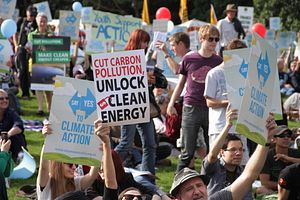As Tony Abbott celebrated the long-awaited repeal of the carbon tax, which passed through the Senate earlier today, a rather unexpected question has re-entered the political debate: will Australia adopt an Emissions Trading Scheme (ETS)?
For the Coalition government, the answer is a definite and resounding “no.” The Liberal Party campaigned vigorously for the carbon tax’s removal during the last election, citing higher energy prices for consumers and the competitive disadvantage facing Australian businesses. In its place, Abbott wants to implement his Direct Action Plan, which will provide $1.55 billion in financial incentives over three years for businesses to reduce emissions.
But for the Labor Party, the answer appears to be a surprising “Yes.” Opposition Leader Bill Shorten reaffirmed his support for an ETS this week, declaring that “any serious policy solution to climate change must, sooner rather than later, include an Emissions Trading Scheme.” Dismissing the government’s views on climate change as “pre-Enlightenment, science-sledging nonsense,” Shorten committed his party once again to the adoption of an ETS. “Fulfilling our responsibility, doing our fair share means setting appropriate emissions targets and building the policy infrastructure to help us meet them,” he told the lower house.
At first glance, the timing may seem a little odd. The carbon tax was both adopted and then abandoned by Labor leaders: Julia Gillard first introduced the carbon price mechanism in 2011 and Kevin Rudd later promised to replace it in 2013 with a floating price on emissions. In reality, though, there was always very little difference between the two. As part of the Clean Energy Bill passed by Gillard, the carbon price was set to become more flexible with a “cap and trade” ETS beginning in 2015. But with Rudd having already abandoned an earlier ETS proposal (the Carbon Pollution Reduction Scheme) in 2010, Labor’s constant backtracking on climate policy eventually became a political liability.
Now out of power, Shorten has been eager to shake up his party’s policy priorities while offering a rather wistful take on the Rudd-Gillard era. Labor was “right to support an emissions trading scheme,” he said, but “settled for second best” with the carbon tax. The opposition leader also regrets the decision by then Prime Minister Rudd not to call a double dissolution when the CPRS was twice defeated in the Senate. “We walked away from calling an election which the nation was entitled to have,” he said.
The political case for an emissions trading scheme has shown few signs of weakening. Last week, fifty-nine of Australia’s leading economists signed an open letter in support of “a well-designed mechanism that puts a price and limit on carbon pollution.” As you would expect of economists, they favor an ETS for its efficiency in reducing emissions, the certainty it provides business and the ability to link up with other global schemes in China, the EU and the United States.
Even with the repeal of the carbon tax, support remains for purchasing emission reductions from developing countries as the least bad alternative for Australia to continue meeting its existing climate commitments. Economist Ross Garnaut, who led a government review on climate policy, has recently suggested keeping the architecture of an ETS in place but setting a much lower carbon price until the government is willing to join international efforts.
A recent report from the Climate Change Authority, which advises the government on climate change policy, reached a similar conclusion: “Australia can complement its domestic efforts by purchasing genuine emissions reduction units from elsewhere in the world.” Purchasing international units, the report said, would be relatively easy to implement and have the same effect as domestic reductions.
Abbott has previously expressed little enthusiasm for the idea of emission credits. Without a carbon price in place, however, it may be harder to deflect criticism that the government is not doing enough to reduce Australia’s carbon emissions. Meanwhile, Shorten has vowed that Labor, seemingly undeterred from recent experience, will support an emissions trading scheme in the next federal election: “I do believe that an ETS argued through, learning the lessons of the past, communicating with Australians, with business – people are up for that.” With the battlelines drawn, it may just take another election before Australia decides definitely whether or not to adopt an ETS.

































